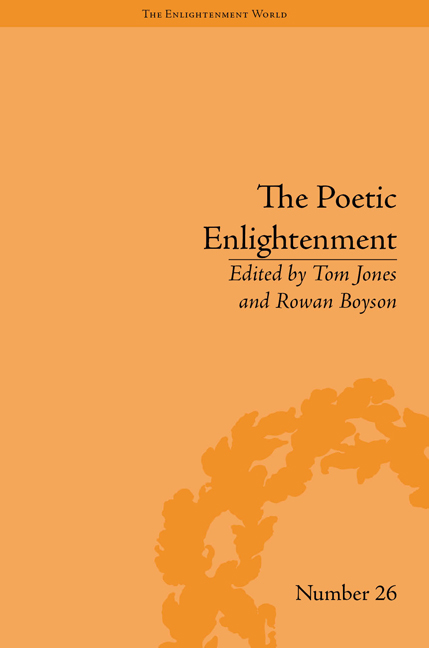Book contents
- Frontmatter
- CONTENTS
- Acknowledgements
- List of Contributors
- General Introduction
- I Poetic Knowledge and the Knowledge of Poetry
- II Poetic Theories of the Social Self
- 5 Introduction
- 6 Hobbes and Davenant: Poetry as Civil Science
- 7 Facing the Misery of Others: Pity, Pleasure and Tragedy in Scottish Enlightenment Moral Philosophy
- 8 Poetical Stoical Shaftesbury
- 9 Morality as a Discourse of the Imagination
- III Enlightenment and Romantic Poetologies
- Notes
- Index
7 - Facing the Misery of Others: Pity, Pleasure and Tragedy in Scottish Enlightenment Moral Philosophy
from II - Poetic Theories of the Social Self
- Frontmatter
- CONTENTS
- Acknowledgements
- List of Contributors
- General Introduction
- I Poetic Knowledge and the Knowledge of Poetry
- II Poetic Theories of the Social Self
- 5 Introduction
- 6 Hobbes and Davenant: Poetry as Civil Science
- 7 Facing the Misery of Others: Pity, Pleasure and Tragedy in Scottish Enlightenment Moral Philosophy
- 8 Poetical Stoical Shaftesbury
- 9 Morality as a Discourse of the Imagination
- III Enlightenment and Romantic Poetologies
- Notes
- Index
Summary
There is a question that is central to many theories of human social life: What exactly do we experience when we face situations where others are in misery? This question, which attracts a great deal of attention before and during the Enlightenment in the context of human science and poetry, is the general theme of the present chapter. In moral philosophy and moral psychology, the theme is intimately linked with a series of questions regarding our passions in general, their moral value, the tragic passions in particular and the theory of tragedy. Many answers to the initial question prominently feature pity or compassion, thus inviting further analyses and evaluations of this passion. Many answers emphasize that, under certain conditions, there is an experience of pleasure when we face the misery of others – a fact that also calls for an explanation. Some answers furthermore present an account of what motivates us to attend rather than avoid scenes where we face the misery of others. And there is, of course, the related question of what we experience when we face representations of the misery of others in a poetic context, for example as tragic fiction on stage or in historical accounts, and how this differs from facing present and real misery.
This chapter discusses a selection of answers to these questions. It is motivated by an interest in the more general debate in moral philosophy concerning the claim that all our affections and passions, including pity, are manifestations of self-love, and that human nature is thus fundamentally selfish – a claim David Hume famously termed the ‘selfish hypothesis’. According to this general view of human psychology, which is often combined with a pessimistic view of human nature, the different aspects of the experience of facing the misery of others can be explained as facets of self-interest.
- Type
- Chapter
- Information
- The Poetic EnlightenmentPoetry and Human Science, 1650–1820, pp. 75 - 88Publisher: Pickering & ChattoFirst published in: 2014

